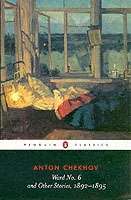Ward No. 6 and other Stories 1892-1895

Editorial Penguin UK
Fecha de edición mayo 2002
Idioma inglés
Traducción de Wilks, Ronald
Prologuista Clayton, Douglas J.
EAN 9780140447866
368 páginas
Libro
encuadernado en tapa blanda
Resumen del libro
There's no morality or logic in the fact that I'm a doctor and you're mentally ill it's pure chance'
These stories from the middle period of Chekhov's career show him exploring complex, ambiguous and often extreme emotions. Influenced by his own experiences as a doctor, Ward No. 6', set in a mental hospital, is a savage indictment of the medical profession. The Black Monk', portraying an academic who has strange hallucinations, explores ideas of genius and insanity; in Murder', religious fervour leads to violence; while in The Student', Chekhov's favourite story, a young man recounts a tale from the gospels and undergoes a spiritual epiphany. In all the stories collected here, Chekhov's characters face madness, alienation and frustration before they experience brief, ephemeral moments of insight, often earned at great cost, where they confront the reality of their existence.
This is the second in three chronological volumes of Chekhov short stories in Penguin Classics. Ronald Wilks's lucid translation is accompanied by an introduction discussing the increasingly experimental style of Chekhov's writing during this time. This edition also contains an annotated bibliography, chronology and explanatory notes.
Biografía del autor
Fernando de Pulgar trabajó sucesivamente en la corte de Juan II de Castilla (que reinó entre 1406 y 1454) y en la de su sucesor, Enrique IV (1454-1474), en la que fue nombrado secretario real y consejero de Estado, confiándosele importantes misiones y embajadas en Roma y en París, así como la educación de varios nobles. Ya se había retirado cuando fue llamado de nuevo a la corte para que ejerciera de cronista real de los Reyes Católicos. Hombre de amplia formación humanista, sus muy influyentes trabajos como historiador x{0026} x02013;entre los que destaca su incompleta Crónica de los Reyes Católicosx{0026} x02013; destacan por la bondad y la elegancia de su prosa. Pero el ingenio y el humor de Fernando de Pulgar hicieron de él, además, un personaje popular, al que se atribuían toda suerte de refranes, consejas y apotegmas. Falleció hacia el año 1492.








